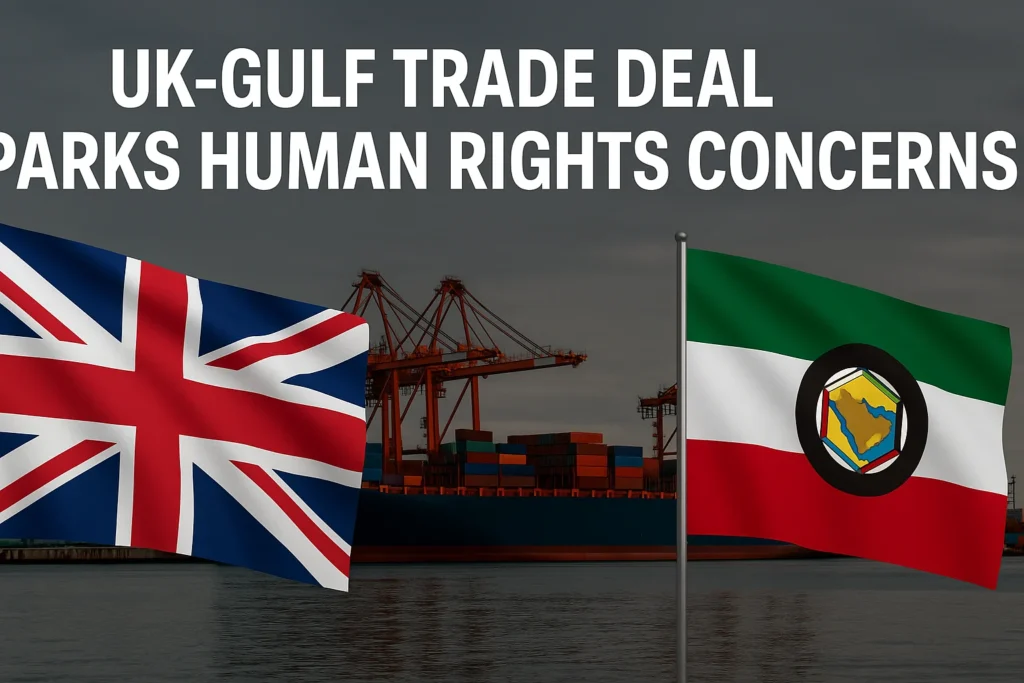Introduction: A Bridge to Billions, But What About the Foundations?
Imagine a vast ocean separating two distant lands, each holding something the other desires. Now, imagine building a bridge across that ocean, promising a flow of wealth and opportunity. This is the vision behind the United Kingdom’s ambitious new trade agreement with the Gulf Cooperation Council (GCC), a powerful group of nations in the Middle East. On the surface, the numbers are dazzling: a deal worth £1.6 billion, set to boost trade by an astounding £8.6 billion every year by 2035. It sounds like a golden opportunity, a way for Britain to forge new economic ties and prosper on the global stage.
But as with any grand construction, the foundations matter. Beneath the gleaming promise of economic growth lie deeper questions, echoing concerns from human rights groups and environmental advocates. Critics worry that this new bridge of trade might not have strong enough supports for fundamental values, particularly regarding human rights and environmental protection in some of the Gulf nations. This isn’t just about money; it’s about the values Britain stands for and the kind of world it wants to build. Let’s explore the hopes and the hurdles of this landmark deal.
The Golden Promise: What the UK-Gulf Deal Means for Trade
At the heart of the UK’s strategy to boost its economy is the pursuit of new trade agreements around the world. The deal with the Gulf Cooperation Council (GCC) stands out as particularly significant, promising a substantial financial uplift for Britain. This isn’t just about selling more goods; it’s about opening up new markets for services, investments, and collaborations that could benefit various sectors of the UK economy.
Unpacking the Numbers
The deal is poised to unlock an initial £1.6 billion in trade, a figure that represents the immediate boost upon finalization. However, the long-term projection is even more impressive: an annual increase of £8.6 billion by 2035. To put this into perspective, that’s billions of pounds flowing into the UK economy each year, potentially supporting jobs, fostering innovation, and strengthening Britain’s position as a global trading nation.
Who is the GCC?
The GCC is a powerful economic and political alliance in the Middle East, comprising six key nations:
- Saudi Arabia: The largest economy in the GCC, a major oil producer, and a country with ambitious economic diversification plans.
- United Arab Emirates (UAE): A global hub for trade, finance, and tourism, known for cities like Dubai and Abu Dhabi.
- Qatar: A major natural gas producer and host of significant international events.
- Kuwait: Another significant oil producer with a strong investment presence.
- Bahrain: A smaller island nation with a developing financial sector.
- Oman: Known for its strategic location and growing tourism sector.
These nations, especially Saudi Arabia and the UAE, are rapidly diversifying their economies away from solely oil and gas, investing heavily in technology, tourism, infrastructure, and renewable energy. This creates new opportunities for UK businesses in areas like financial services, education, healthcare, advanced manufacturing, and green technologies. The UK hopes to be a key partner in this transformation, securing long-term economic benefits.
The Shadow Side: Human Rights Concerns in the Gulf
While the economic opportunities are clear, the pursuit of trade deals with certain GCC nations often comes with a significant ethical challenge: their records on human rights. For years, human rights organizations and activists have raised serious concerns about practices within some of these countries, creating a complex dilemma for nations like the UK that champion democratic values.
Specific Concerns Raised by Critics
Critics of the UK-Gulf trade deal point to several ongoing issues:
- Freedom of Expression and Dissent: In countries like Saudi Arabia, there are reports of severe restrictions on freedom of speech, with journalists, dissidents, and activists facing arrest, detention, and harsh sentences for expressing views critical of the government.
- Treatment of Migrant Workers: The GCC nations rely heavily on millions of migrant workers, often from South Asia and Africa, who perform much of the manual labor. Human rights groups frequently report issues with the “kafala” sponsorship system, which can tie workers to their employers, leading to exploitation, low wages, poor living conditions, and difficulty changing jobs or leaving the country.
- Women’s Rights: While some reforms have been made in recent years, particularly in Saudi Arabia and the UAE, concerns remain regarding legal protections for women, guardianship laws, and gender equality.
- LGBTQ+ Rights: Homosexuality and other LGBTQ+ identities are criminalized in many GCC nations, with severe penalties.
- Fair Trial Standards: Concerns exist regarding the fairness of judicial processes, access to legal representation, and the use of the death penalty.
Organizations like Amnesty International and Human Rights Watch consistently document these issues, urging Western governments to prioritize human rights in their foreign policy and trade negotiations. The challenge for the UK is how to balance the clear economic benefits of the deal with these deeply held concerns about fundamental freedoms and dignity.
The Green Divide: Environmental Protection in the Deal
Beyond human rights, another area of significant concern for critics of the UK-Gulf trade deal is the apparent lack of strong, binding commitments on environmental protections. As the world grapples with climate change and the need for sustainable practices, trade agreements are increasingly seen as opportunities to push for higher environmental standards globally.
Why Environmental Commitments Matter
- Climate Change: The Gulf nations are major oil and gas producers, and their continued reliance on fossil fuels is a significant contributor to global carbon emissions. Critics argue that any new trade deal should include strong clauses to encourage a faster transition to renewable energy and more sustainable practices.
- Pollution and Resource Management: Rapid development in some GCC countries has led to concerns about air and water pollution, waste management, and the sustainable use of scarce resources like water.
- Global Standards: As the UK strives to be a leader in climate action, critics believe it should use its trade agreements to promote higher environmental standards internationally, not just focus on economic gains.
The concern is that if the trade deal prioritizes quick economic wins without robust environmental safeguards, it could inadvertently contribute to practices that are harmful to the planet in the long run. Environmental groups are calling for specific, measurable commitments on reducing emissions, investing in green technologies, and protecting natural resources within the agreement. The absence of such binding clauses makes the deal a point of contention for those championing a greener future.
The Debate in London: Criticism from All Sides
The prospect of a UK-Gulf trade deal has not been met with universal approval in London. Instead, it has ignited a fierce political debate, with opposition parties and human rights organizations leading the charge of criticism. This isn’t just about minor disagreements; it’s about fundamental questions of values, strategy, and responsibility on the global stage.
“Ethical Blind Spot” Accusations
Critics argue that the UK government, in its eagerness to secure economic benefits, is turning a blind eye to the human rights records of some GCC member states. Phrases like “ethical blind spot” or “values for cash” are often used to describe what opponents see as a compromise of British principles for financial gain.
- Labour Party: Opposition Labour MPs have been vocal in their condemnation. They argue that any significant trade agreement should include strong, enforceable clauses on human rights and labor standards. They fear that signing a deal without these commitments sends the wrong message globally and could implicitly endorse the problematic practices of some regimes.
- Green Party and Liberal Democrats: These parties often place a strong emphasis on both human rights and environmental protection. They join the chorus of criticism, demanding that the UK government demonstrate genuine commitment to these issues, not just in rhetoric but in legally binding trade agreements.
- Human Rights Organizations: Groups like Amnesty International and Human Rights Watch have actively lobbied the government and parliamentarians, providing detailed reports on abuses and advocating for the inclusion of robust human rights clauses with clear enforcement mechanisms. They argue that trade should be a tool for positive change, not a means to overlook abuses.
The core of the criticism is that by not including binding commitments, the UK might lose its leverage to influence positive change and could even be seen as prioritizing profit over people.
The Government’s Balancing Act: Defending the Deal
Facing a wave of criticism, the UK government finds itself in a delicate balancing act. On one side are the clear economic imperatives – the need to secure new trade opportunities in a post-Brexit world and boost the economy. On the other are the persistent calls to uphold human rights and environmental standards. The government argues that the trade deal is part of a broader strategy that includes dialogue and engagement, not just trade.
Arguments for the Deal
The government’s defense often centers on these points:
- Economic Imperative: They emphasize the substantial economic benefits for the UK, arguing that the £8.6 billion annual boost will create jobs, support businesses, and strengthen the national economy. In a competitive global market, securing such deals is seen as crucial.
- Engagement, Not Isolation: The government typically argues that engaging with countries through trade and diplomatic ties is a more effective way to encourage reform than isolating them. They suggest that a trade deal opens doors for dialogue on human rights and other issues.
- Separate Channels for Human Rights: Officials often state that human rights concerns are addressed through separate diplomatic channels, bilateral dialogues, and international forums, rather than solely within trade agreements. They might argue that overburdening trade deals with too many non-trade clauses can make them impossible to finalize.
- Phased Approach: Sometimes, the argument is made that trade relationships can evolve, and that future agreements or reviews could incorporate stronger human rights commitments as trust and economic ties deepen.
The government’s position is that this deal is a pragmatic step to secure significant economic gains, and that it maintains its commitment to human rights and environmental protection through other means. This approach, however, remains a source of ongoing tension and debate.
Human Rights Clauses: The Core of the Contention
The central point of contention in the debate over the UK-Gulf trade deal is the absence of binding commitments on human rights. What does this actually mean, and why is it such a significant issue for critics?
What is a Binding Commitment?
In international agreements, a “binding commitment” means that the parties involved are legally obliged to adhere to certain standards or actions. If they fail to do so, there are usually consequences, such as disputes being heard by an international body, or penalties like trade sanctions.
- Non-Binding Language: In contrast, a deal might include “non-binding” language, such as statements about shared values, cooperation on human rights, or aspirations for better environmental practices. While these sound good, they don’t carry the force of law and cannot be enforced through the agreement’s dispute resolution mechanisms.
Why Critics Demand Binding Clauses
Human rights organizations and opposition parties insist on binding clauses because:
- Accountability: They provide a mechanism to hold signatory countries accountable if they violate human rights or environmental standards. Without them, there’s no legal recourse within the trade framework.
- Leverage: Trade deals offer significant economic leverage. Critics argue that this leverage should be used to push for improvements in human rights and environmental practices, rather than simply accepting existing conditions.
- Credibility: For the UK, including binding clauses would enhance its credibility as a nation that genuinely prioritizes human rights and environmental protection, aligning its trade policy with its stated values.
- Preventing “Race to the Bottom”: Without such clauses, there’s a risk that countries might compete by lowering standards (e.g., on labor or environmental protection) to attract investment, rather than raising them.
The argument is that a trade agreement is a powerful tool for diplomacy and influence, and to miss the opportunity to embed core values within its structure is a missed chance for positive change.
Global Context: Trade vs. Values in the 21st Century
The UK-Gulf trade deal is not an isolated incident. It reflects a broader global challenge facing many nations in the 21st century: how to balance the undeniable economic benefits of trade with the imperative to uphold and promote universal values like human rights, democracy, and environmental sustainability.
The Shifting Landscape
- Economic Interdependence: The world is more interconnected than ever, making trade a powerful force for growth and development.
- Rising Awareness: At the same time, there is increasing public and political awareness of human rights abuses and environmental degradation around the world.
- Ethical Consumerism: Consumers are increasingly demanding that products are sourced ethically and sustainably, putting pressure on governments and corporations.
Many countries, including those in the EU and the US, grapple with similar dilemmas when negotiating trade deals with nations that have different human rights or environmental standards. There’s no easy answer, and approaches vary from strict conditionality to more engagement-based strategies.
The UK’s decision to finalize this deal without explicit binding commitments on human rights and environmental protection sets a precedent for its future trade policy. It will be closely watched by international observers and will continue to fuel debate within the UK about the true cost and value of its global economic ambitions.
Conclusion: The Path Ahead for UK-Gulf Relations
The impending finalization of the £1.6 billion UK-Gulf trade agreement marks a significant chapter in Britain’s economic future, promising an £8.6 billion annual boost by 2035. This ambitious deal with the Gulf Cooperation Council (GCC) nations – including powerhouses like Saudi Arabia and the UAE – represents a clear strategy to forge new economic partnerships and stimulate growth.
However, the path to this economic prosperity is fraught with contention. The lack of binding commitments on human rights and environmental protections within the deal has drawn sharp criticism from opposition parties, human rights organizations, and environmental advocates. They argue that Britain risks compromising its fundamental values for financial gain, raising concerns about potential complicity in problematic practices and undermining the UK’s moral standing on the global stage.
As the UK government defends its position, emphasizing the economic imperative and the effectiveness of separate diplomatic channels for addressing concerns, the debate highlights a fundamental dilemma of modern foreign policy: how to balance the pursuit of wealth with the upholding of principles. The UK-Gulf trade deal stands as a powerful example of this ongoing tension, a bridge built for billions, but one whose foundations will continue to be scrutinised by those who demand that prosperity goes hand-in-hand with human dignity and environmental stewardship. The future of UK-Gulf relations will be a continuous negotiation, not just of goods and services, but of values and global responsibility.




e260qr